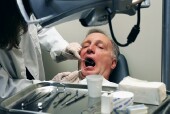- Double Mastectomy May Offer No Survival Benefit to Women With Breast Cancer
- Toxic Lead Found in Cinnamon Product, FDA Says
- Certain Abbott Blood Sugar Monitors May Give Incorrect Readings
- Athletes Can Expect High Ozone, Pollen Counts for Paris Olympics
- Fake Oxycontin Pills Widespread and Potentially Deadly: Report
- Shingles Vaccine Could Lower Dementia Risk
- Your Odds for Accidental Gun Death Rise Greatly in Certain States
- Kids From Poorer Families Less Likely to Survive Cancer
- Tough Workouts Won’t Trigger Cardiac Arrest in Folks With Long QT Syndrome
- At-Home Colon Cancer Test Can Save Lives
Could Poor Dental Health Signal a Faltering Mind?


Tooth loss and bleeding gums might be a sign of declining thinking skills among the middle-aged, a new study contends.
“We were interested to see if people with poor dental health had relatively poorer cognitive function, which is a technical term for how well people do with memory and with managing words and numbers,” said study co-author Gary Slade, a professor in the department of dental ecology at the University of North Carolina at Chapel Hill.
“What we found was that for every extra tooth that a person had lost or had removed, cognitive function went down a bit,” Slade said. “People who had none of their teeth had poorer cognitive function than people who did have teeth, and people with fewer teeth had poorer cognition than those with more.”
“The same was true when we looked at patients with severe gum disease,” he said.
Slade and his colleagues reported their findings in the December issue of The Journal of the American Dental Association.
To explore a potential connection between oral health and mental health, the authors analyzed data gathered between 1996 and 1998 that included tests of memory and thinking skills, as well as tooth and gum examinations, conducted among nearly 6,000 men and women. All the participants were between the ages of 45 and 64.
Roughly 13 percent of the participants had no natural teeth, the researchers said. Among those with teeth, one-fifth had less than 20 remaining (a typical adult has 32, including wisdom teeth). More than 12 percent had serious bleeding issues and deep gum pockets.
The researchers found that scores on memory and thinking tests — including word recall, word fluency and skill with numbers — were lower by every measure among those with no teeth when compared to those who had teeth.
The researchers also found that having fewer teeth and serious gum bleeding were associated with worse scores on the tests, compared to those with more teeth and better gum health.
Which condition developed first? The answer is murky, the researchers said.
“It could be that poor dental health reflects a poor diet, and that the lack of so-called ‘brain foods’ rich in antioxidants might then contribute to cognitive decline,” Slade said. “It could also be that poor oral health might lead to the avoidance of certain foods, thereby contributing to cognitive decline.”
“It could also be that dental disease, especially gum disease, gives rise to inflammation not only in the gums but throughout the circulatory system, ultimately affecting cognition,” he said.
“If we want to focus on what might actually be contributing to cognitive decline and how to screen for that, then perhaps [poor] dental health should be thought of as yet another indication of both poor overall health and poor cognition,” Slade said. “It’s certainly a factor to be aware of.”
Catherine Roe, an assistant professor of neurology at the Washington University School of Medicine, in St. Louis, said the findings were “fascinating.”
“Oral health isn’t a widely talked about risk factor for cognition issues, and from this study we can only tell there’s an association between the two, not that it’s causal,” Roe said.
“But the idea of a relationship between the two is certainly a very interesting possibility,” she said. “It could be that systemic inflammation might have an overall effect on both dental health and cognition, as they discuss in the paper.”
“There might be a genetic link between the two diseases, with a certain gene promoting both oral health issues and cognition problems,” Roe said. “Or, of course, it could simply be that if you’ve got cognitive problems you just aren’t taking very good care of your teeth.”
“The thing to do is to continue to follow these people, who are now in their 50s and 60s, which is actually very early to develop dementia or Alzheimer’s disease,” she said. “It would be good to see to what extent the people who … have teeth problems today but are cognitively normal right now go on to develop cognitive issues.”
More information
For more on dental care, visit the U.S. National Institutes of Health.
Source: HealthDay
Copyright © 2024 HealthDay. All rights reserved.










